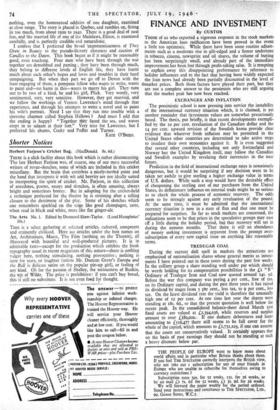FINANCE AND INVESTMENT
By CUSTOS THOSE of us who expected a vigorous response in the stock markets to the American loan ratification have been proved in the event a little too optimistic. While there have been some routine adjust- ments such as a moderate rise in gilt-edged and a firmer undertone in tobacco, cinema, newsprint and oil shares, the volume of buying has been surprisingly small, and already part of the immediate improvementlas been lost through profit-taking sales. It is tempting to explain away this disappointing performance by reference to holiday influences and to the fact that having been widely expected the loan news had already been partially discounted in the level of ilknarket prices. Both those factors have played their part, but they are not a complete answer to the pessimists who are still arguing that the market peak has now been reached..
EXCHANGES AND INFLATION The pessimistic school is now pressing into service the instability of the international currency situation which, it is claimed, is yet another reminder that h.-vestment values are somewhat precariously based. The thesis, put briefly, is that recent developments exempli- fied by the to per cent. revaluation of the Canadian dollar and the 14 per cent. upward revision of the Swedish krona provide clear
evidence that whatever fresh inflation may be permitted in the United States other countries are determined to take active steps to insulate 'their own economies against it. It is even suggested that several other countries, including not only Switzerland and Norway but the United Kingdom itself, may follow the -Canadian and Swedish examples by revaluing their currencies in the near future.
Prediction in the field of in- ternational exchange rates is notoriously dangerous, but it would be surprising if any decision were to be taken yet awhile to give sterling a higher exchange value in terms of U.S. dollars. While such a step would have the desirable effect of cheapening the sterling cost of our purchases from the United States, its deflationary influence on internal trade might be so serious as to check the whole process of economic recovery. The odds seem to be strongly against any early revaluation of the pound. At- the same time, it must be admitted that the international currency situation is now in a state of flux and that one must be prepared for surprises. So far as stock markets are concerned, the indications seem to be that prices in the speculative groups may ease off a little during the holiday period, but that recovery will set in during the autumn months. That there is" still an abundance of money seeking investment is apparent from the prompt over- subscription of every new capital issue on anything like reasonable terms.
TREDEGAR COAL
During the current dell spell in markets the attractions are emphasised of nationalisation shares whose general merits as invest- ments I have pointed out in these notes during the past few weeks. In the colliery group a share standing well under par which should be worth holding for its compensation possibilities is the Li " B " Ordinary of Tredegar Iron and Coal now quoted around ms. 9d. Before the war this company was paying 4 per cent., free of tax, on its Ordinary capital, and during the past three years it has raised its dividend by stages from 5 ptr cent., less tax, to 9 per cent., less tax. On the latest dividend rate the yield is therefore the unusually high one of 12 per cent. At one time last year the shares were standing at 18s. 6d., so that the present quotation is well below the recent peak. In the consolidated balance-sheet dated March 31st fixed assets are valued at L2,394,036, while reserves and surplus amount to over £18o,000.- If one deducts debentures and loans amounting to £516,477 there still seems to be full cover for the whole of the capital, which amounts to L1,731,103, if one can assume that the assets are conservatively valued. It certainly. appears that on the basis of past earnings they should not be standing at such a heavy discount below par.


























 Previous page
Previous page